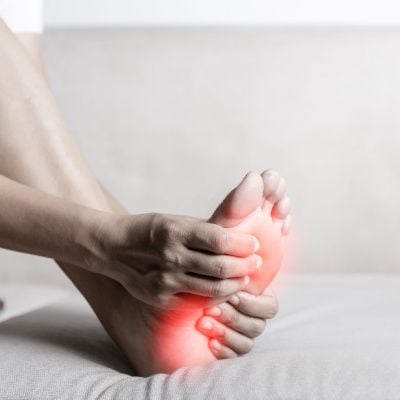Joint Pain in the Foot
- Created in Ball/Joint/Tendon
 Joint pain in the foot is a prevalent and often debilitating condition that can significantly impact an individual's mobility and overall quality of life. In this comprehensive guide, we will delve into the complexities of foot joint pain, exploring its various causes, symptoms, diagnostic methods, and effective management strategies. By understanding the nuances of this condition, individuals can make informed decisions about their foot health and seek appropriate care when needed.
Joint pain in the foot is a prevalent and often debilitating condition that can significantly impact an individual's mobility and overall quality of life. In this comprehensive guide, we will delve into the complexities of foot joint pain, exploring its various causes, symptoms, diagnostic methods, and effective management strategies. By understanding the nuances of this condition, individuals can make informed decisions about their foot health and seek appropriate care when needed.
Unveiling Foot Joint Pain
The Foot's Complex Anatomy
The foot is a marvel of intricate design, comprising numerous joints that work harmoniously to support body weight, facilitate movement, and absorb shock. When these joints experience pain, it can originate from various structures, including bones, ligaments, tendons, and synovial membranes.
Common Types of Foot Joint Pain
- Arthritis: Inflammation of the joints, such as osteoarthritis or rheumatoid arthritis.
- Gout: A form of arthritis caused by the accumulation of uric acid crystals in the joints.
- Sprains and Strains: Injuries to ligaments and tendons can lead to joint pain.
- Bursitis: Inflammation of the fluid-filled sacs (bursae) that cushion joints.
- Fractures: Breaks in the bones of the foot can cause severe joint pain.
Causes of Foot Joint Pain
Arthritis in the Foot
- Osteoarthritis: Degeneration of joint cartilage over time.
- Rheumatoid Arthritis: An autoimmune condition causing joint inflammation.
- Psoriatic Arthritis: A form of arthritis associated with psoriasis.
Gout and Uric Acid Buildup
Excess uric acid can crystallize in the joints, causing sudden and intense pain, commonly affecting the big toe.
Traumatic Injuries
Sprains, strains, and fractures resulting from accidents or sports injuries can lead to acute or chronic joint pain.
Recognizing Symptoms of Foot Joint Pain
Persistent Pain
Chronic or recurrent pain in one or more joints of the foot is a key symptom of joint-related issues.
Swelling and Inflammation
Inflamed joints may appear swollen, red, and warm to the touch.
Stiffness and Reduced Range of Motion
Difficulty moving the affected foot, coupled with stiffness, is indicative of joint involvement.
Diagnosing Foot Joint Pain
Clinical Assessment
Healthcare professionals conduct a thorough examination, assessing pain levels, joint flexibility, and overall foot structure.
Imaging Studies
X-rays, MRIs, or CT scans may be ordered to visualize the internal structures of the foot and identify abnormalities.
Blood Tests
In cases of arthritis or systemic conditions, blood tests can help detect markers of inflammation and autoimmune responses.
Management Strategies for Foot Joint Pain
Medications
- Nonsteroidal Anti-Inflammatory Drugs (NSAIDs): Alleviate pain and reduce inflammation.
- Corticosteroids: Administered for severe inflammation, often through injections.
- Disease-Modifying Antirheumatic Drugs (DMARDs): Prescribed for autoimmune-related arthritis.
Physical Therapy
Tailored exercises can strengthen muscles, improve joint flexibility, and enhance overall foot function.
Orthotic Devices
Custom orthotic inserts or supportive footwear can redistribute weight and provide relief to affected joints.
Lifestyle Modifications
Maintaining a healthy weight, adopting joint-friendly exercises, and avoiding high-impact activities can minimize stress on the foot joints.
Living with Foot Joint Pain
Pain Management Strategies
Heat or cold therapy, rest, and elevation can offer relief from acute pain and reduce inflammation.
Assistive Devices
Utilizing assistive devices like canes or braces can aid in mobility and reduce strain on affected joints.
Emotional and Psychological Impact
Coping with Chronic Pain
Seeking support from healthcare professionals, support groups, or mental health experts is essential for managing the emotional toll of chronic foot joint pain.
Patient Education
Educating individuals about their condition, treatment options, and coping mechanisms empowers them to actively participate in their care.
Seeking Professional Guidance
Podiatrists and Rheumatologists
Consulting with podiatrists specializing in foot conditions and rheumatologists with expertise in arthritis ensures a comprehensive approach to foot joint pain management.
Pain Specialists
In cases of severe and persistent pain, pain specialists can provide targeted interventions and pain management strategies.
Conclusion
In conclusion, foot joint pain is a multifaceted condition with diverse causes and manifestations. Understanding the underlying factors, recognizing symptoms, and adopting effective management strategies are crucial steps toward improving foot health and overall well-being. By combining medical interventions with lifestyle modifications, individuals can actively engage in their journey to alleviate foot joint pain and regain mobility, enhancing their quality of life in the process.
Disclaimer:
The information on this website is provided for educational and information purposes only and is not medical advice. Always consult with a licensed medical provider and follow their recommendations regardless of what you read on this website. If you think you are having a medical emergency, dial 911 or go to the nearest emergency room. Links to other third-party websites are provided for your convenience only. If you decide to access any of the third-party websites, you do so entirely at your own risk and subject to the terms of use for those websites. Neither Sheldon H. Nadal, D.P.M., nor any contributor to this website, makes any representation, express or implied, regarding the information provided on this website or any information you may access on a third-party website using a link. Use of this website does not establish a doctor-patient relationship. If you would like to request an appointment with a health care provider, please call our office at (416) 486-9917.
